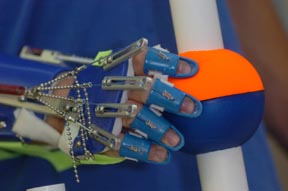JACKSON, Miss.—As a registered nurse, Tina Marucci of Brandon is no stranger to medical emergencies.
Still, nothing prepared Marucci for the scene that met her on December 18, 2001. She came home from a weekend away to find her 26-year-old husband Joe sprawled on the floor, unable to move or talk. “I knew in my head that it was a stroke,” she said. “But I was in a state of disbelief. I thought: ‘This isn’t happening to us.’ ”
As a healthy college student, Joe was an unlikely candidate for a calamity most associate with the elderly. And it turns out his stroke was something of a fluke. Tina said the culprit was probably an unexplained tear in a blood vessel in his neck. “They think that when it was trying to seal off, it threw a clot to his brain.”
More than three years later, the whole experience “still seems surreal,” Tina said. But the Maruccis aren’t mired in the futility of asking “what-if?” They’re solidly focused on the future and the gains Joe is making at Methodist Rehabilitation Center’s outpatient clinic in Flowood.
Joe’s recent advances illustrate a discovery that is sparking optimism in the rehabilitation field. Contrary to long-held beliefs, studies are showing that the brain has the capacity to rewire long after a stroke or injury.
“It has recently been proven that you can reactivate existing, but silent, brain connections and make new connections,” said Dr. Dobrivoje Stokic, director of the Center for Neuroscience and Neurological Recovery (CNNR) at Methodist Rehabilitation Center in Jackson. “So rehabilitation should not be considered only a short-term goal.”
Joe has stuck with it, and his reward has been an improvement in his ability to use his right arm. Occupational therapist Peggy Kelly credits the return to a breakthrough rehab device that has created a buzz of excitement among those who treat upper extremity disorders.
Called a SaeboFlex, the colorful contraption looks like a robotic glove you might wear to play a virtual reality video game. Developers of the spring-loaded device say it allows people with little or no hand control to practice grasping and releasing objects, a therapy that has helped some regain function up to 20 years post-injury.
Kelly is among the first Mississippi therapists trained to use the device, and she’s glad she jumped on the bandwagon. “I have seven patients on my caseload now and they are from eight months to five years post-stroke. It’s not necessarily making their arm normal again, but they are gaining functional use. They can use their hand to grasp and open a jar or a door.”
The therapy has been especially beneficial in helping Joe overcome abnormal muscle tightness or spasticity in his right arm. “When he first started, you should have seen us getting his splint on. It was like a wrestling match,” Kelly said. “He’s much more relaxed now.”
Joe’s primary goal is to regain function in his right hand, which would greatly ease his duties as a stay-at-home dad for 6-month-old Will. Kelly said she recently saw Joe easily lift his son out of a piece of play equipment, a feat he couldn’t do before working with the SaeboFlex.
Kelly said a nice bonus is that the SaeboFlex seems to have improved the muscle tone in Joe’s right ankle and foot, too. “It’s like it has been a chain reaction.”
While undergoing therapy with the SaeboFlex, Joe performs a variety of exercises, such as putting pegs into holes or passing balls through a hoop. It can be exhausting work, but Joe does it all with good-natured determination. “I’ve never seen him in a bad mood,” Kelly said.
Because Joe has aphasia – a stroke-related communication disorder that makes it difficult to express his thoughts – he talks mainly in short sentences. But his grin speaks volume, particularly when the topic is Will. Asked to name his favorite thing to do with his son, Joe smiled and said: “Everything.”
The Maruccis now set their compass according to family concerns, a new direction that was motivated by Joe’s close call. “It definitely makes you more appreciative of the time you have and what’s important,” Tina said.
Now in medical school, Tina said her fear of losing Joe nearly derailed her lifelong desire to be a doctor. “Before, I took for granted the years I had with him. I decided medical school was not that important if it meant four years of not seeing him that much.”
But Joe insisted, and Tina got back to her studies. Still, she says she’s no longer the Type A student she used to be. If the choice is between doing something with Joe and Will or studying for a test, family usually wins out.
That may leave her with a lowered grade point average, but Tina has no doubt that her experiences with Joe’s illness and rehab will make her a better doctor. “Now I deal as much with family as I do with patients. I know what they are going through and how scared they are.”
The physical medicine physicians, certified rehabilitation nurses, researchers, social workers, vocational rehabilitation counselors, dieticians, psychologists, biomedical engineers and physical, occupational and speech therapists who make of the state’s most comprehensive stroke team at Methodist Rehabilitation Center have treated more than 12,000 patients since the Jackson hospital’s stroke program began 30 years ago. Methodist is one of only 16 hospitals in the nation designated as a Traumatic Brain Injury Model System by the National Institute on Disability and Rehabilitation Research. It is also home to Quest, an outpatient program that helps people with brain injuries successfully return to school, work or community life.


